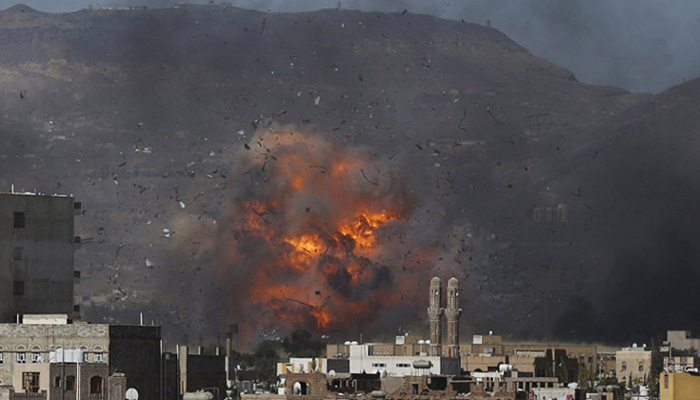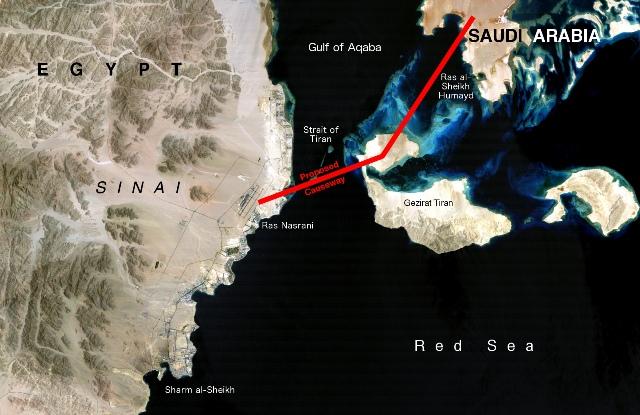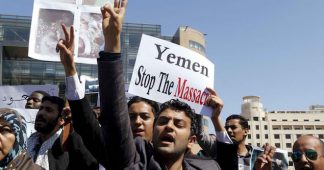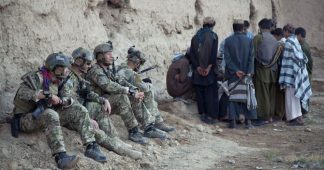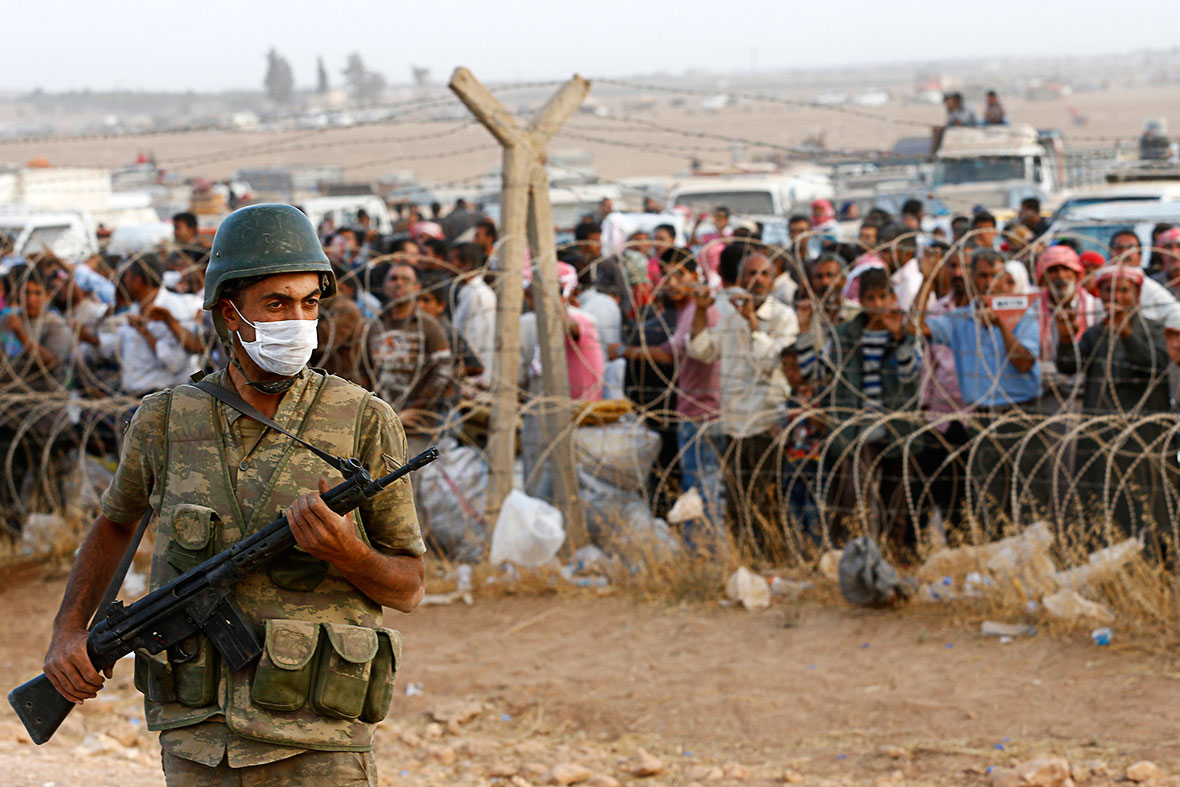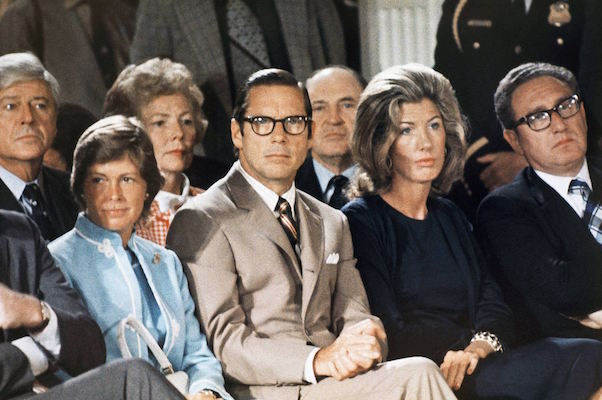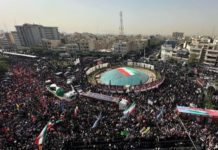By Catherine Shakdam
If Yemen has been the forgotten war of our generation – the untold story of a violent war of theocratic occupation, Yemen has also suffered from much media bias, and political bigotry. In our day and age, military conflicts are as much fought on the ground as they are in through the airwaves – in this global community we all live in, perception is absolutely everything.
Perception – or rather, the manipulation of reality, has allowed for Western powers to play imperialism for well over a decade, while cloaking themselves in Democracy’s holy shroud. Perception today can turn war criminals into heroes, and freedom fighter into dangerous dissidents. Remember those words: dissident, rebel fighter … It is often through such semantic lenses that the Houthis have been portrayed.
Pariahs among all pariahs, the Houthis have been called many names, and accused of many deeds – never have they really been offered the courtesy of the truth. Seldom has anyone truly bother to look at this one tribal faction to understand what movement their leaders breathe life into – not for themselves, but for the people they have come to represent in their struggle.
But let us first go back to the lies mainstream have told you about Yemen!
What have you been told of Yemen’s war? What is it that you believe to be true in this mess which is Southern Arabia? If like millions, and potentially billions of people around the world you have relied on mainstream media to get a lay of the land, you might be in for quite a surprise … You have been lied to. No let me rephrase that – you have been played and manipulated into following Saudi Arabia’s political narrative, so that, your governments (Western governments) could rationalize their support of imperialism, while still proclaim democracy to be alive and well.
In all fairness the manipulation is not that sophisticated.
So far Yemen’s war has been sold as a war of democratic restoration – a selfless attempt by the Saudi regime to save Yemen from the tyranny of the Houthis, and the radicalism of al-Qaeda. We also have been told, although less often, that Yemen’s war has been a war of self-defense. I recall how in a recent debate on Yemen US Foreign Policy & National Security Analyst, Lawrence J. Korb asserted that Saudi Arabia had every right to defend its national sovereignty and security!
While I personally abide by the belief that every sovereign nation has an inherent and inalienable right to self-defense … and yes it includes Palestinians, I’m not quite clear on how this principle applies to Saud Arabia.
At which point did Saudi Arabia fear for its sovereignty? Unless of course we are to assume that Yemen somewhat stands an extension of the kingdom. In THAT case I can see just how threatening the Houthis would have been to Riyadh. No good theocracy likes itself a freedom fighter! For a country which cannot bring itself to allow women to hold a driving licence I can see how the Houthis would have presented a difficult challenge.
Can you imagine – calling for democracy, political transparency, and political accountability? The nerves of those people … Didn’t they realise that in the land of al-Saud not even the wind is allowed to roam free … All must bow to the might of al-Saud monarchy – the Bedouins of Nejd, the tyrants of Arabia!
But of course Yemen does not belong to Saudi Arabia – and while Riyadh has tried to change that reality, Yemen still stands an independent nation-state in Southern Arabia … Need I stress that Yemen is the LAST independent nation in Arabia, and that it is such independence the kingdom is ultimately working to crush and lay waste.
The Houthis never posed a threat to Saudi Arabia – at least not in the way mainstream media framed it. While I will concede that the Houthis represent an inherent ideological threat to Saudi Arabia in that this one tribal faction of Yemen’s Highlands now turned political movement offers a freedom which scares the leaving daylight out of Saudi Arabia’s theocrats; the Houthis never planned to invade the kingdom … Okay this is not exactly true!
The Houthis never planned to infringe on the kingdom’s true territorial integrity. By true, I mean Saudi Arabia’s land – not those provinces it claimed away from Yemen in the 1930s … History again! I will ask you once more to humour my propensity to look back, to better understand today.
Yemen and Saudi Arabia border has been subject to much contention over the past nine decades. And while nine decades might seem like a long time to hold a territorial grudge, ask yourself just how long you would yourself fight for what is rightfully yours. Let us not ask of Yemen to let go if its territorial claim, just because it would make our lives easier. Let us instead appreciate the reality of their situation.
Yemen and Saudi Arabia reached a tentative border agreement back in 2000 – the Jeddah agreement, in which then-President Ali Abdullah Saleh essentially signed off on three Yemeni provinces. With the stroke of a pen, President Saleh ended 65 years of tribal tensions, sporadic fighting, and much unrest. Surprise, surprise, Yemen landed on the short end of the straw … as for President Saleh, some have argued he received a payment of as much as $20 million to put his name on the dotted line. Opposition groups told the press back in 2011 they believed Saleh had received a payment of $18 billion in exchange for his cooperation in solving Yemen-Saudi Arabi land dispute.
But since no documents were ever leaked to that regard, I will put down such allegations to hear and say.
Yemen and Saudi Arabia long-standing boundary dispute can be traced back to the controversial Mecca Agreement in 1926. The agreement determined that the South West Idrisi emirate, which is home to three provinces: Asir, Jizan and Najran, would now belong to the newly established kingdom of Saudi Arabia.
Needless to say that Yemen northern tribes were not exactly thrilled with that set-up since it meant the partition of their land, their territories, their people. Moving forward Yemen and Saudi Arabia’s land disputes became the subject of heated political and tribal debates – an open wound onto the highlands, a betrayal, Yemen highlanders would never forgive, never mind forgot about.
But politicians are fickle creatures … In 1934 the Treaty of Taif expressly reaffirmed Azir, Jizan, and Najran to be Saudi provinces. Under the terms of the agreement Yemen and Saudi Arabia’s became “final and permanent.”
That of course was counting without the determination of the Houthis, and the tenacity of Yemen northern tribes.
Not long after the signature of the Treaty, the legality of the agreement was challenged and all Yemeni governments since 1932 publicly thereafter rejected its terms, arguing they were forcibly imposed by Saudi Arabia. Yemen then demanded that a new border agreement be drawn.
On the matter, Yemen had a strong ally in late Egyptian President Gamal Abdel Nasser who famously declared “Any power can attack the Yemeni people … the Yemeni revolution is our revolution, and the revolution of all the Arabs … We could simply isolate Saudi from Yemen completely by taking Jizan and Najran. The Jizan province belongs to Yemen and was usurped by the Saudis in an invasion in 1930.
The Yemenis have the right to demand [the return] of Jizan and Najran. We will be fighting in this war. We Egyptians alongside the Yemenis…Therefore no power can attack the Yemeni people’s revolution.”
Former President Saleh however crushed Yemen’s dreams to see its rich lands restored when he agreed in 2000 to abandon all sovereignty claims on the provinces of Asir, Jizan and Najran.
If you have been following developments in Yemen you will recall that Asir, a rights organization, announced back in 2012 it had started a national campaign to return what it called “Yemen stolen territories” from the Saudi occupiers.
The NGO was immediately dismissed as a pro-Iranian agent, a Shia-pawn in Arabia’s grand sectarian chess game. Funny how groups and individuals can be dismissed off the bat for allegedly being linked up to Tehran. As if such an association entails criminality … More to the point, why have we failed to challenge such statement? Whether or not Asir has in fact harboured a friendship with Iran does not take away from the legitimacy of its claim against Riyadh. But more on that later …
In June 2012 Abdul Rahman al-Ashwal, the group’ spokesperson told me in an interview that his primary goals is ” to create internal Yemeni awareness and establish and deepen the importance of a national popular awareness of its rights and territories under Saudi occupation. Preparations are underway to establish a popular and civil protest movement against the Taif and Jeddah border agreements.”
He stated the importance of “unifying the internal Yemeni front through rejecting Saudi control over Yemeni decision-making processes and indicting public figures who hold their hands out to Saudi money as well as taking legal action against them for their involvement and assistance in abdicating Yemen’s historical right to its territories, occupied by our usurping neighbour and its wealth, land, and natural resources.”
Asir has based its claims on a comment which late President Ibrahim al-Hamdi made in 1977 during a state visit to Taif in Saudi Arabia. He then told the king: “I am still in Yemeni territory. If you wish to discuss the issue, we can start with this point.”
Asir’s main argument is that territorial rights do not have a statute of limitation. Legally speaking the group is right – politically speaking Asir has stood on very shaky ground. Why you may ask? Because NO ONE stands up to Saudi Arabia and live to financially tell the tale!
If my words might seem harsh, they are nevertheless true. Saudi Arabia has hugged the moral, and political high-ground on account of its billions of petrodollars and its control over vat natural resources. The kingdom weighs heavy on Western capitals … heavy indeed!
But the Houthis care not for politics and diplomacy … at least not when Yemen’s territorial integrity is at stake, and certainly not when Yemen’s future stands in the balance.
Let it go already? It happened some 90 something years ago you argue?! Ok let’s see how you feel once I tell you that those three provinces would propel Yemen high on the oil food chain. When I say high … I mean way high, higher than the Kingdom of Saudi Arabia itself.
Do I have your undivided attention now?
Should Yemen’s stolen lands be restored Yemen would no longer be the most impoverished nation in Southern Arabia. Yemen would sit where it was always meant to sit – at the head of the Arabia’s table. But money and access to natural resources are the only cards Yemen would then have at its disposal.
Allow me to introduce you to a very different Yemen – a Yemen which still could be if only Riyadh was to withdraw back behind its real borders.
Yemen today stands still the most populous nation in Arabia, with an estimated 26 million people. Yemen also sits atop the world oil route – a powerful geopolitical tool which played right could assert Yemen as a regional superpower. Now computes its military power in, and you have built yourself an economic and political juggernaut!
Do you understand now why Yemen represents such a threat? Do you see why Riyadh has been so bent on destroying, and discrediting the Houthis.
If Saudi Arabia can rule unchallenged and undisturbed over Arabia’s monarchies, knowing that its size alone would deter any unruly neighbours from rising against al-Saud, Yemen is an entire matter altogether. The country’s natural resources surpass by far that of the kingdom – should it be made whole once more, and its military might could quite comfortably withstand any foreign threats. I would say that 2015 established just how militarily resilient Yemen can be in the face of aggravated pressure.
According to recent studies Yemen’s oil reserves would account for 30% of the world’s reserves, outbidding Saudi Arabia itself. And though so far Yemen has been unable to exploit its oil and gas resources, – given half a chance Yemen could rise a giant in the region; a thought which is not exactly thrilling al-Saud Royals.
